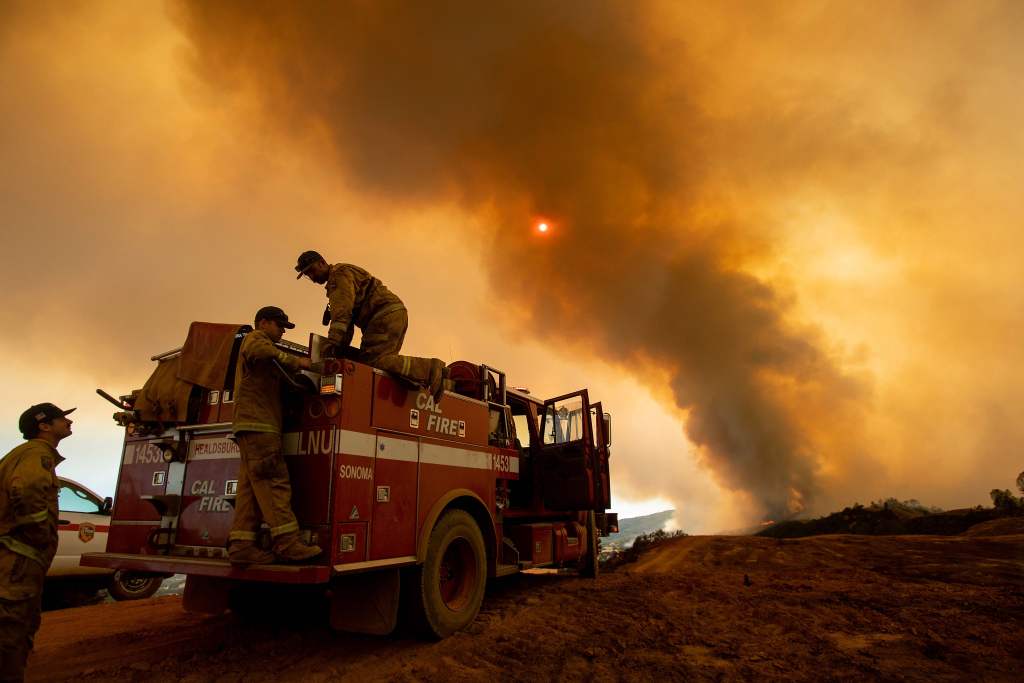Just days before the California legislature is to consider a controversial net neutrality bill regulating internet service providers, a Verizon lawyer told lawmakers that those kinds of regulations are “very unrelated” to a recent incident in which his company slowed down data speeds for Bay Area firefighters actively battling a major fire.
Verizon testified before a California State Assembly committee Friday in Sacramento, explaining why and how it “throttled” the Santa Clara County Fire Department earlier this summer during the Mendocino Complex Fire, the largest wildfire in state history. The department chief has said the throttling deprived his firefighters of access to critical information, endangering them.
Verizon’s actions have rekindled the national debate over net neutrality rules overturned by the Trump administration late last year. Those rules are intended to force broadband companies to give all customers comparable service, and many critics have insisted they would have protected firefighters’ internet access.
But during the hearing, Verizon representatives said the throttling was caused by a “process operational error,” in which an employee failed to turn off the data speed caps as requested by the fire department. But Verizon insisted the data caps — which were a feature of the department’s low-cost data plan — have no link to net neutrality.
“It’s apples and oranges,” said Rudy Reyes, Verizon’s assistant general counsel in the western U.S. region. “(Net neutrality) addresses the issue of content discrimination, and we’ve made it clear we do not do that. This situation is not that. This situation is that a customer reached its prescribed limit of its contractural data plan and the data was reduced. We had a process where it can be lifted, but there was an error.”
Assemblymember Marc Levine, D-Marin, who chairs the committee, seemed to side with Reyes. He prefaced his question to Reyes by saying the throttling and net neutrality connections are “conflated” and “different issues.” In an interview with this news organization on Thursday, he echoed that they are “separate problems.”
Not everyone agrees.
California Professional Firefighters threw their support Friday behind the pro-net neutrality bill in the California legislature, SB822, demanding the restoration of Obama-era regulations written by then-FCC Chairman Tom Wheeler in 2015, which the Trump administration-led Federal Communications Commission repealed in 2017.
“By implementing net neutrality, SB 822 will help prevent internet service providers from throttling, thereby preventing data speeds to be manipulated and, in turn, avoid crippling, or worse, deadly outcomes,” said the CPF in a statement on Friday.
Wheeler added in an interview with this news organization Friday that throttling was definitely an issue addressed under the net neutrality rules he wrote.
“What we did was specifically put in the rule about the ability to review activities,” Wheeler said. “We called it the general conduct rule. It was based on the concept that you never really know what technology is going to do next, what the marketplace is going to do next. In this era of rapid change, you want to have flexibility to respond to new situations.”
Lawmakers in Washington, D.C., also weighed in Friday afternoon. Congresswomen Anna Eshoo and Nancy Pelosi, along with 11 other Northern California-based members of Congress, demanded an investigation from the Federal Trade Commission.
“It is unacceptable for communications providers to deceive their customers, but when the consumer in question is a government entity tasked with fire and emergency services, we can’t afford to wait a moment longer,” read Eshoo and Pelosi’s letter. “The FTC must investigate whether Verizon and other communications companies are being unfair or deceptive in the services they’re offering to public safety entities, and if so, to determine what remedies are appropriate to ensure our first responders have adequate service when lives are on the line.”
Before answering questions from the State Assembly’s Select Committee on Natural Disaster, Response, Recovery and Rebuilding, Reyes revealed that Verizon is immediately lifting all data caps on public safety workers for unlimited data plans in four U.S. states, including California.
Verizon will allow public safety workers, such as firefighters, police officers and Emergency Medical Services personnel — as well as the federal justice agencies, including the FBI, CIA and Secret Service — to have unlimited data with no price increases and data caps, said Tami Erwin, executive vice president of operations for Verizon Wireless. The new plan rolls out nationwide next week but was granted immediately for Washington, California and Oregon because of devastating summer wildfires and for Hawaii, which was bracing for Hurricane Lane, a Category 2 storm.
Erwin added that the new plan had been in development for more than eight months.
“This is not a reaction to Santa Clara,” she said. “This is not in response to what has happened this week but rather in response to what customers have been telling us and the increase in natural disasters that we’ve seen.”
Santa Clara County Fire Department chief Anthony Bowden testified Friday before Verizon announced the plan. He said he hoped Verizon and other providers will provide assurances this will never happen again and asked state lawmakers to “harden our infrastructure to protect cell towers” against wildfires, which assist both first responders and evacuees.
“With my staff, I would rather keep my head down than speak publicly,” said Bowden. “I really truly hope there is a greater partnership (with cellular providers) where this does not happen with any public agency.”
In his testimony, Bowden said the Mendocino Complex Fire was the third time since December 2017 where his department was throttled. In the first case, during the Thomas Fire in Santa Barbara, Verizon lifted the data cap in 20 minutes after the department reached out to a company accounts manager.
After the second throttling experience at the Pawnee Fire in June 2018, the department upgraded to a slightly more expensive plan. But the issue was exacerbated at the Mendocino Complex Fire in July, as the staff could not reach a Verizon accounts manager, despite multiple phone calls and emails, until a day later.
In the meantime, the dispatched firefighters used wifi hotspots from adjacent units and had routing devices shipped to their base camp overnight to keep internet connectivity.
The fire department use both Verizon and AT&T, in case they have to hop from one provider to another depending on connectivity, Bowden said. During peak wildfire seasons, one station may be billed $1,000 extra for going over the data cap, he added.
Coffee Break
“The thing about public safety is it is very difficult to predict when it’s going to happen,” said Bowden. “There are down times and there are huge spikes when it comes to data. … We are a medium-sized department, and we don’t have unlimited funds.”
Staff writer Levi Sumagaysay contributed to this report.









